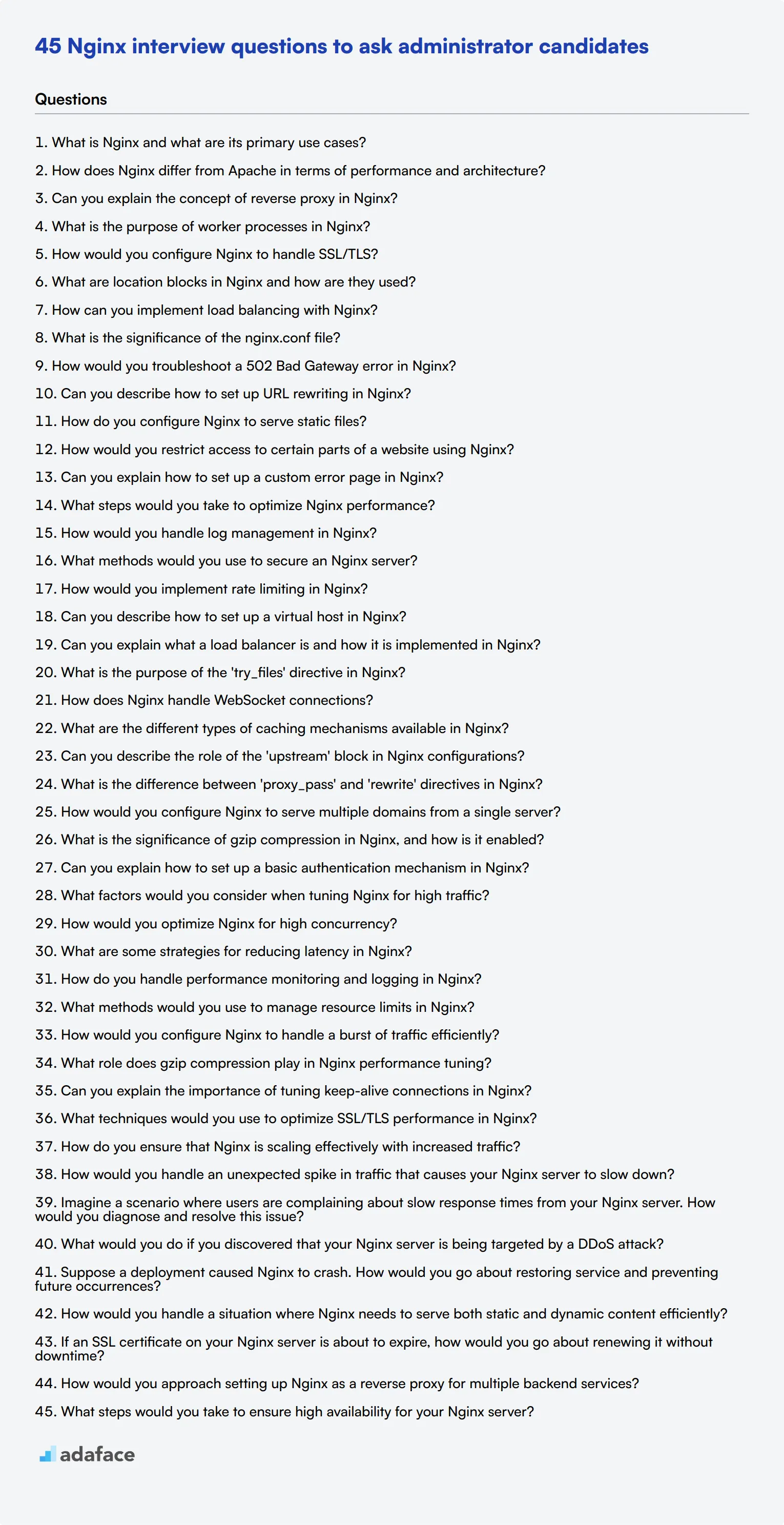Hiring a skilled Nginx administrator can be challenging, and it's crucial to ask the right questions during interviews to evaluate candidates effectively. By using targeted questions, you can better understand a candidate's depth of knowledge and practical experience with Nginx and avoid the cost and frustration associated with a poor hire.
This blog post is designed to help recruiters and hiring managers with a comprehensive list of Nginx interview questions. It covers various levels of expertise and scenarios, ensuring you are well-equipped to assess candidates from junior administrators to top-tier professionals.
Using these questions, you can streamline your interview process, making it more efficient and effective in identifying qualified candidates. Additionally, consider using our Nginx online test before the interview to further ensure the technical proficiency of applicants.
Table of contents
10 Nginx interview questions to initiate the interview
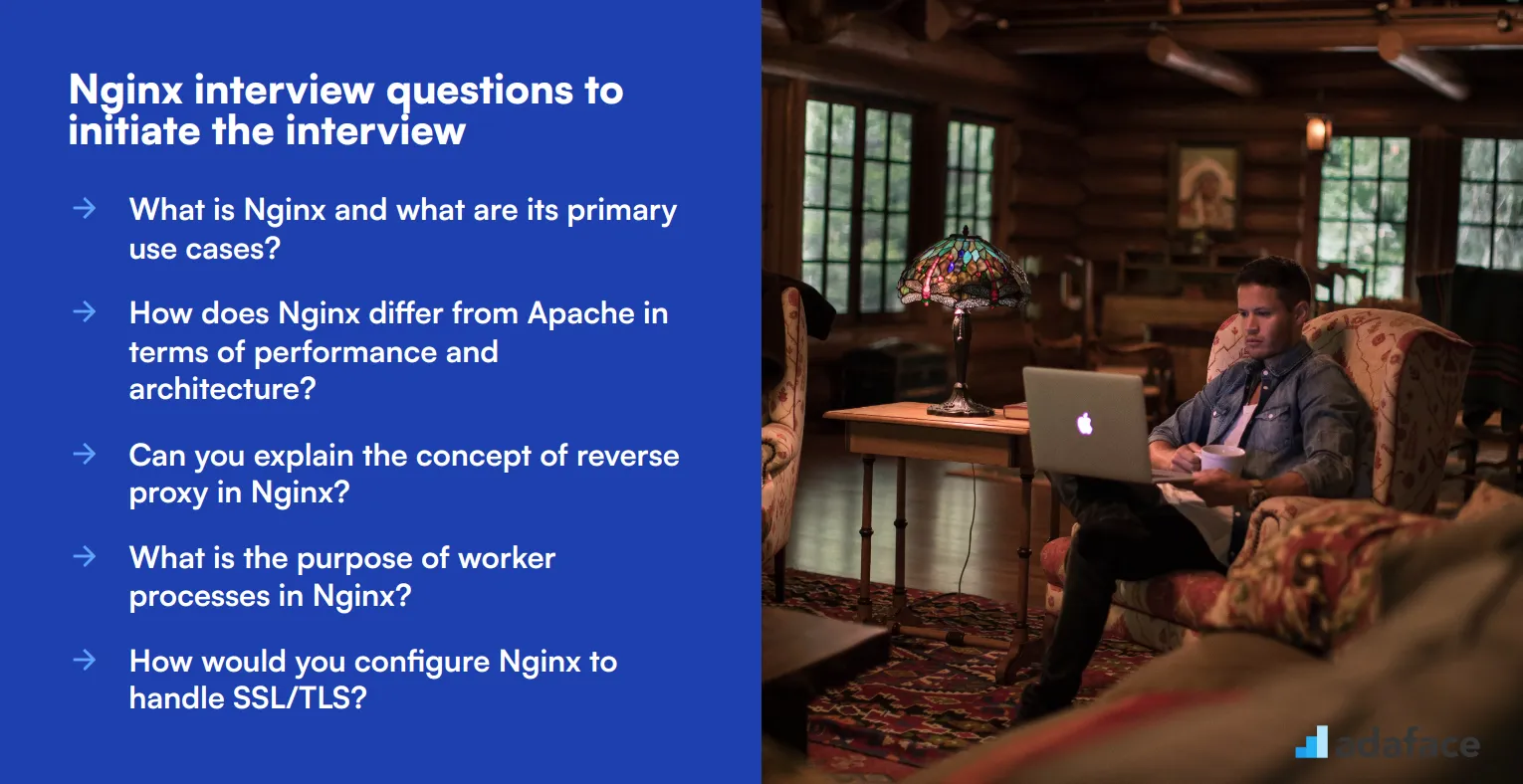
To gauge a candidate's understanding of Nginx and its role in web server management, start with these foundational questions. These queries are designed to help you assess a DevOps engineer's basic knowledge and practical experience with Nginx, setting the stage for a more in-depth technical discussion.
- What is Nginx and what are its primary use cases?
- How does Nginx differ from Apache in terms of performance and architecture?
- Can you explain the concept of reverse proxy in Nginx?
- What is the purpose of worker processes in Nginx?
- How would you configure Nginx to handle SSL/TLS?
- What are location blocks in Nginx and how are they used?
- How can you implement load balancing with Nginx?
- What is the significance of the nginx.conf file?
- How would you troubleshoot a 502 Bad Gateway error in Nginx?
- Can you describe how to set up URL rewriting in Nginx?
8 Nginx interview questions and answers to evaluate junior administrators
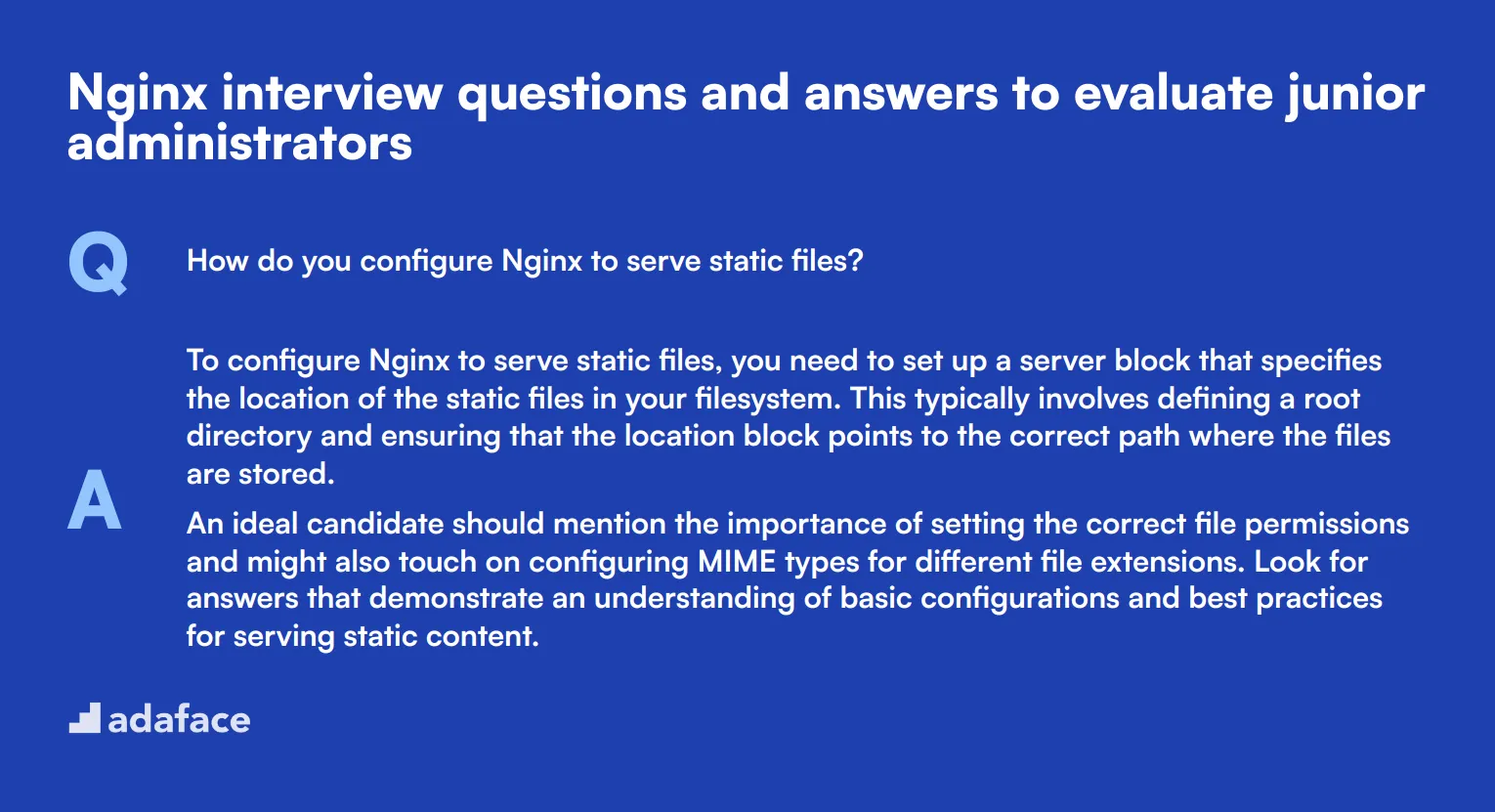
To evaluate whether junior administrators grasp the essential concepts and practicalities of Nginx, consider using these insightful interview questions. This list will help you gauge their understanding and ensure they possess the foundational skills needed to manage and troubleshoot Nginx in a real-world setting.
1. How do you configure Nginx to serve static files?
To configure Nginx to serve static files, you need to set up a server block that specifies the location of the static files in your filesystem. This typically involves defining a root directory and ensuring that the location block points to the correct path where the files are stored.
An ideal candidate should mention the importance of setting the correct file permissions and might also touch on configuring MIME types for different file extensions. Look for answers that demonstrate an understanding of basic configurations and best practices for serving static content.
2. How would you restrict access to certain parts of a website using Nginx?
You can restrict access to certain parts of a website in Nginx by using directives like 'allow' and 'deny', which can be placed within location blocks. Another common method is to use HTTP basic authentication, which requires setting up a password file and configuring the authentication directives in your server block.
A strong response should include specific methods like IP-based access control or HTTP authentication and should highlight the importance of securing sensitive areas of a website. Follow up by asking for examples of scenarios where they implemented such restrictions.
3. Can you explain how to set up a custom error page in Nginx?
Setting up a custom error page in Nginx involves creating the custom error page, placing it in a directory accessible by the server, and then configuring Nginx to use this page for specific HTTP status codes. This is done by adding 'error_page' directives to your server block.
The ideal candidate should explain the steps clearly and might also mention the importance of providing helpful, user-friendly error pages. Look for their ability to customize responses based on different error scenarios, which shows a deeper understanding of user experience considerations.
4. What steps would you take to optimize Nginx performance?
To optimize Nginx performance, you can adjust worker_processes and worker_connections settings to better utilize server resources. Additionally, enabling caching, tuning buffer sizes, and using gzip compression can significantly improve performance.
Candidates should mention these strategies and ideally discuss their experience with performance tuning in real-world scenarios. A well-rounded answer might also touch on monitoring tools and metrics used to measure the impact of these optimizations.
5. How would you handle log management in Nginx?
Log management in Nginx involves configuring access and error logs, specifying the log format, and setting the path where logs should be stored. You can manage log rotation using external tools like logrotate to ensure logs don't consume too much disk space.
A good candidate should elaborate on the importance of log analysis for troubleshooting and monitoring purposes. They might also mention using centralized logging solutions to aggregate logs from multiple servers for easier analysis.
6. What methods would you use to secure an Nginx server?
Securing an Nginx server involves several steps, including configuring SSL/TLS for encrypted communication, setting up HTTP security headers, and ensuring that server tokens are hidden. Additionally, it's essential to keep Nginx and its dependencies updated to mitigate vulnerabilities.
The ideal candidate should provide a comprehensive overview of these methods and might also discuss the importance of regular security audits and monitoring. Follow up with questions about their experience with specific security incidents and how they handled them.
7. How would you implement rate limiting in Nginx?
Rate limiting in Nginx can be implemented using the 'limit_req_zone' and 'limit_req' directives. These directives help control the number of requests a user can make to the server within a specified time frame, which is useful for mitigating DDoS attacks and preventing abuse.
Look for candidates who can explain the configuration process clearly and discuss the practical applications of rate limiting. An ideal answer would also touch on the need to balance security with user experience, ensuring legitimate users are not adversely affected.
8. Can you describe how to set up a virtual host in Nginx?
Setting up a virtual host in Nginx involves creating a new server block in the configuration file, specifying the server name(s), and defining the root directory for the website's files. You also need to ensure that the correct location blocks and other necessary configurations are included.
A strong candidate response should highlight the importance of isolating configurations for different sites and mention the use of separate configuration files for better manageability. This demonstrates their understanding of best practices in web server configuration.
10 Nginx questions related to technical definitions
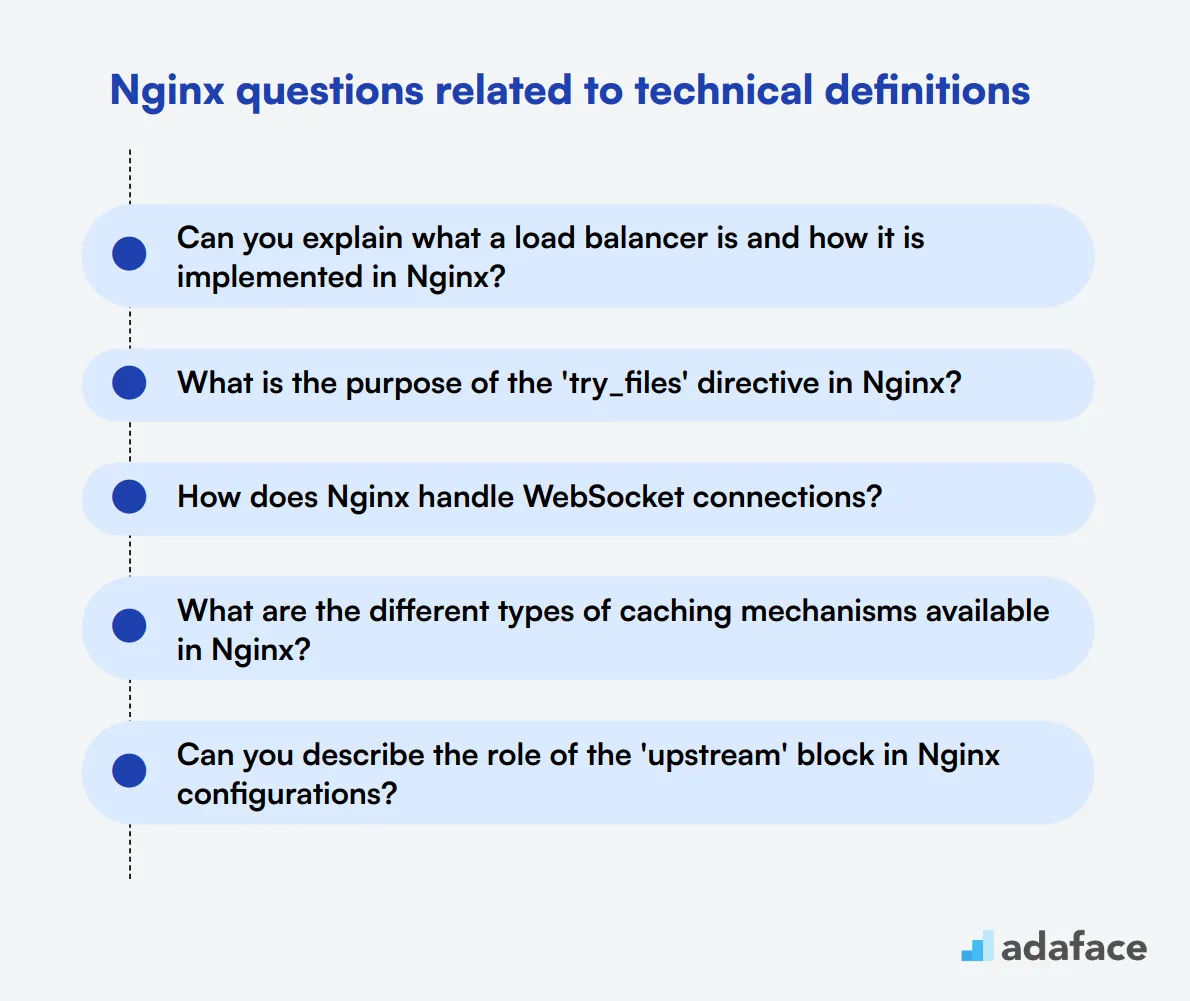
To assess whether candidates possess a solid grasp of Nginx's technical terminology, utilize this list of essential interview questions. These queries will help you determine if the applicant can effectively navigate the complexities of Nginx, which is crucial for roles like a DevOps Engineer.
- Can you explain what a load balancer is and how it is implemented in Nginx?
- What is the purpose of the 'try_files' directive in Nginx?
- How does Nginx handle WebSocket connections?
- What are the different types of caching mechanisms available in Nginx?
- Can you describe the role of the 'upstream' block in Nginx configurations?
- What is the difference between 'proxy_pass' and 'rewrite' directives in Nginx?
- How would you configure Nginx to serve multiple domains from a single server?
- What is the significance of gzip compression in Nginx, and how is it enabled?
- Can you explain how to set up a basic authentication mechanism in Nginx?
- What factors would you consider when tuning Nginx for high traffic?
9 Nginx interview questions and answers related to performance tuning
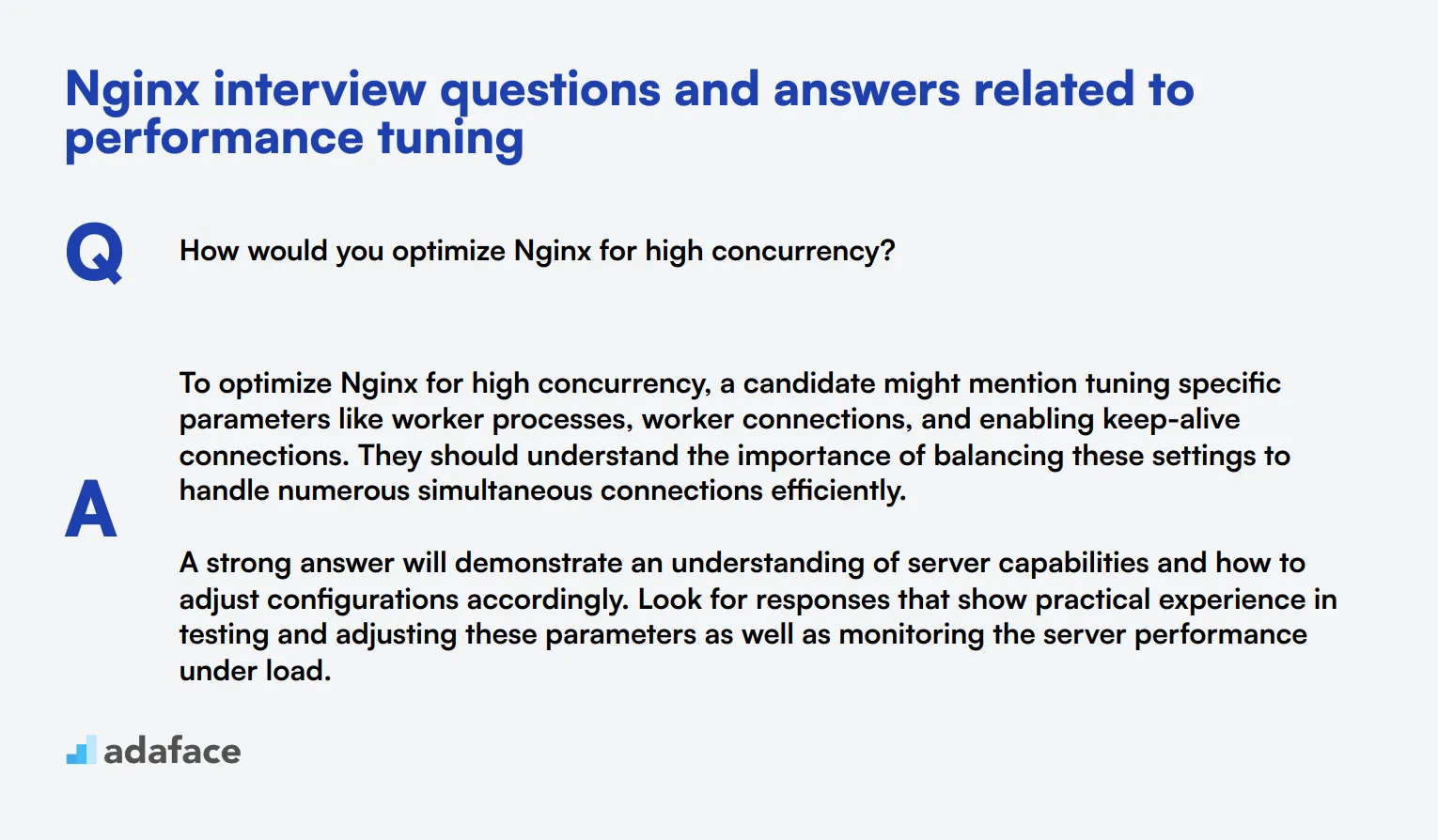
To gauge whether your candidates have the right skills for fine-tuning Nginx performance, ask them some of these focused interview questions. These questions will help you understand their ability to optimize configurations and manage high-traffic scenarios effectively.
1. How would you optimize Nginx for high concurrency?
To optimize Nginx for high concurrency, a candidate might mention tuning specific parameters like worker processes, worker connections, and enabling keep-alive connections. They should understand the importance of balancing these settings to handle numerous simultaneous connections efficiently.
A strong answer will demonstrate an understanding of server capabilities and how to adjust configurations accordingly. Look for responses that show practical experience in testing and adjusting these parameters as well as monitoring the server performance under load.
2. What are some strategies for reducing latency in Nginx?
Candidates might suggest several strategies for reducing latency in Nginx, such as implementing caching, enabling gzip compression, and optimizing SSL/TLS settings. Caching can significantly reduce response times for frequently requested resources, while gzip compression reduces the size of data sent to clients.
Ideal answers will focus on practical implementations and may reference real-world scenarios where these strategies were successfully applied. Look for candidates who can explain the trade-offs and monitoring techniques to ensure performance gains are effectively realized.
3. How do you handle performance monitoring and logging in Nginx?
Performance monitoring and logging in Nginx involve configuring access and error logs to capture detailed information about server activity. Candidates may mention tools like the Elasticsearch, Logstash, and Kibana (ELK) stack for centralized logging and visualization.
A well-rounded answer should include specifics on setting up log formats, rotating logs, and using monitoring tools to analyze logs for performance bottlenecks. Recruiters should look for candidates who demonstrate a proactive approach to performance monitoring and troubleshooting.
4. What methods would you use to manage resource limits in Nginx?
To manage resource limits in Nginx, candidates might mention directives like 'worker_rlimit_nofile' to adjust the maximum number of open files and 'client_body_buffer_size' to control the size of the client request body buffer. These settings help prevent resource exhaustion and maintain server stability.
Strong responses will highlight an understanding of system resource management and practical experience in configuring these limits based on the server workload. Look for candidates who can articulate the impact of these settings and how they monitor resource usage.
5. How would you configure Nginx to handle a burst of traffic efficiently?
Handling a burst of traffic efficiently in Nginx involves several techniques, such as increasing worker processes and connections, enabling caching, and using a content delivery network (CDN). Load balancing can also distribute traffic across multiple servers to prevent any single point of failure.
Effective answers will demonstrate knowledge of these techniques and highlight real-world examples where they were applied. Look for candidates who understand the importance of proactive planning and can discuss how they monitor and adjust configurations to handle traffic spikes.
6. What role does gzip compression play in Nginx performance tuning?
Gzip compression reduces the size of data being transmitted from the server to the client, which can significantly improve load times for web pages. Enabling gzip in Nginx involves configuring the 'gzip' directive and specifying the types of files to compress.
Candidates should explain the balance between compression levels and CPU usage, as well as the impact on bandwidth utilization. A solid response will show an understanding of how to configure gzip effectively and monitor its performance benefits.
7. Can you explain the importance of tuning keep-alive connections in Nginx?
Keep-alive connections allow a single TCP connection to remain open for multiple HTTP requests, reducing the overhead of establishing new connections. Tuning keep-alive settings involves configuring the 'keepalive_timeout' and 'keepalive_requests' directives.
A proficient candidate will explain how keep-alive connections improve performance by reducing latency and server load. Look for candidates who can discuss the appropriate settings for different use cases and how they monitor the impact on server performance.
8. What techniques would you use to optimize SSL/TLS performance in Nginx?
Optimizing SSL/TLS performance in Nginx involves enabling session caching and session tickets, configuring OCSP stapling, and using modern ciphers. These techniques reduce the latency associated with SSL/TLS handshakes and improve overall connection speed.
Answers should reflect an understanding of both security and performance considerations. Look for candidates who can explain the trade-offs involved and provide examples of how they have successfully implemented these optimizations in the past.
9. How do you ensure that Nginx is scaling effectively with increased traffic?
Ensuring Nginx scales effectively with increased traffic involves using load balancing, optimizing configurations, and monitoring server performance. Candidates might mention horizontal scaling by adding more servers and vertical scaling by upgrading hardware resources.
A comprehensive answer will include strategies for proactive monitoring and adjusting configurations based on traffic patterns. Look for candidates who can provide examples of scaling strategies they have implemented and how they ensured that performance remained optimal during traffic surges.
8 situational Nginx interview questions with answers for hiring top administrators
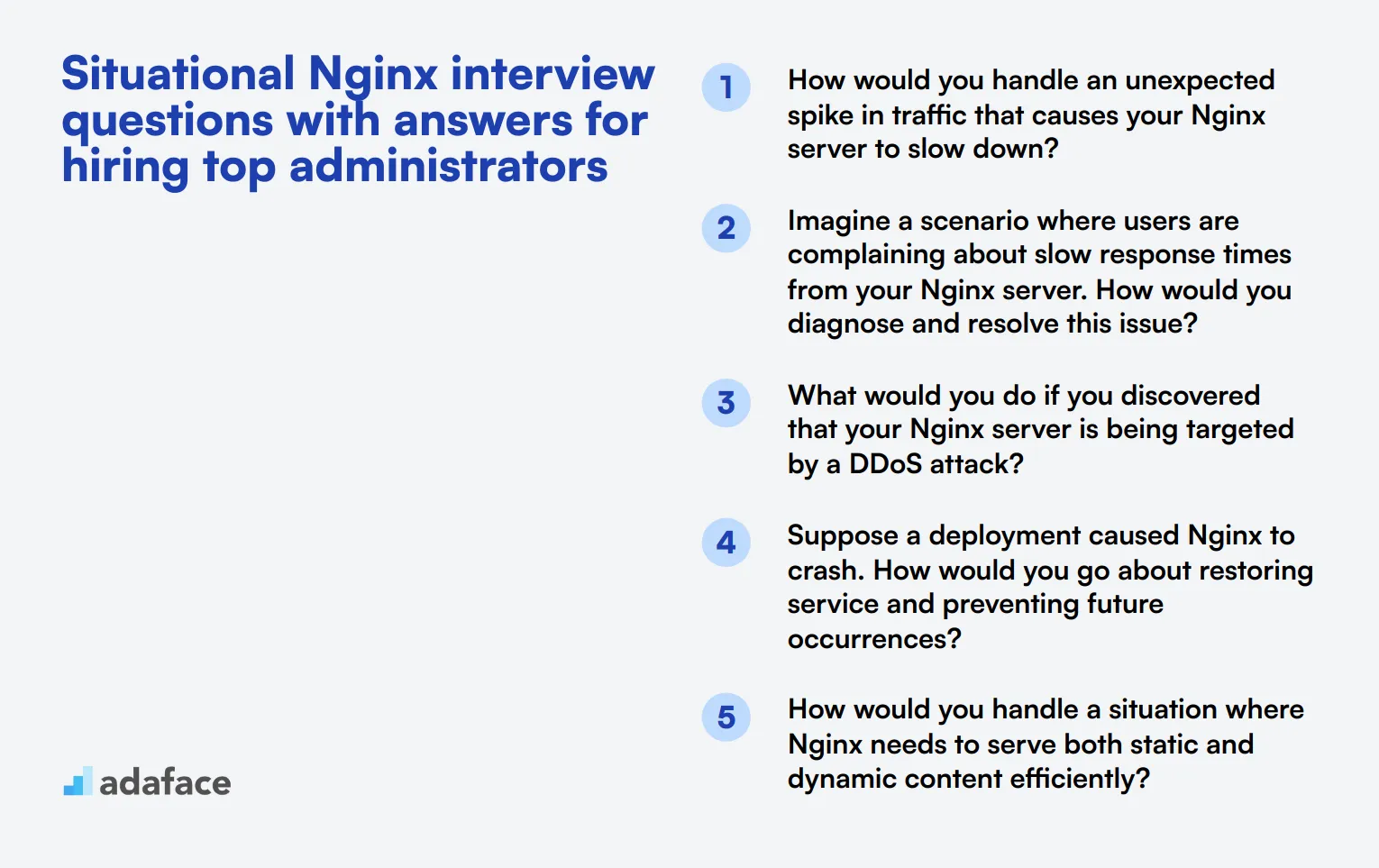
To assess whether your Nginx administrator candidates have the right skills and can handle real-world situations, use these situational Nginx interview questions. These questions will help you delve deeper into their problem-solving abilities and practical knowledge, ensuring you hire the best fit for your team.
1. How would you handle an unexpected spike in traffic that causes your Nginx server to slow down?
An experienced candidate might mention steps such as scaling the number of worker processes, optimizing current configurations, or implementing caching to reduce load. They could also explore using a load balancer to distribute traffic more effectively.
Look for candidates who can outline a clear, multi-step approach and show an understanding of both immediate and long-term solutions. Follow up by asking how they would monitor the server's performance post-optimization.
2. Imagine a scenario where users are complaining about slow response times from your Nginx server. How would you diagnose and resolve this issue?
Candidates should mention checking server logs for error messages or slow request patterns, as well as using monitoring tools to identify bottlenecks. They might also consider optimizing the server configuration or increasing resources.
Strong candidates will show familiarity with diagnostic tools and techniques and emphasize a methodical, data-driven approach to troubleshooting. Ask about specific tools they have used in the past to gauge their hands-on experience.
3. What would you do if you discovered that your Nginx server is being targeted by a DDoS attack?
A competent candidate would likely suggest implementing rate limiting, using a Web Application Firewall (WAF), or configuring Nginx to drop suspicious traffic. They may also mention collaborating with your ISP to mitigate the attack.
Assess whether the candidate can explain these concepts clearly and shows a proactive approach to security. Follow up by asking how they would monitor traffic to prevent future attacks.
4. Suppose a deployment caused Nginx to crash. How would you go about restoring service and preventing future occurrences?
The candidate might describe rolling back to a previous configuration, analyzing logs to identify the root cause, and carefully re-deploying after making necessary adjustments. They may also suggest implementing automated testing to catch issues before deployment.
Look for a structured and calm approach to crisis management. A good follow-up question would be asking how they document these incidents to improve future deployments.
5. How would you handle a situation where Nginx needs to serve both static and dynamic content efficiently?
Candidates should mention using Nginx to serve static content directly while proxying dynamic content to a backend server. They may also discuss caching strategies to reduce the load on the backend.
An ideal response will show an understanding of Nginx's strengths and how to leverage them. Consider asking about their experience with similar configurations in past roles.
6. If an SSL certificate on your Nginx server is about to expire, how would you go about renewing it without downtime?
Experienced candidates will describe a process involving obtaining the new certificate, verifying its authenticity, and then updating the Nginx configuration to use the new certificate. They might also mention testing the new certificate in a staging environment before applying it to production.
The key here is to gauge their attention to detail and ability to perform critical updates without disrupting service. Follow up by asking how they would automate this process in the future.
7. How would you approach setting up Nginx as a reverse proxy for multiple backend services?
Candidates should discuss configuring Nginx to listen on specific ports and forwarding requests to the appropriate backend services based on request URLs. They may also mention using location blocks to distinguish between different services.
Look for clear explanations and a sound strategy. Inquire about any challenges they faced while setting up similar configurations in the past to further assess their problem-solving skills.
8. What steps would you take to ensure high availability for your Nginx server?
A strong candidate will talk about setting up load balancers, using multiple Nginx instances, and implementing failover mechanisms. They might also mention monitoring health checks to ensure each instance is functioning properly.
Evaluate their understanding of redundancy and failover strategies. Asking for examples from their past experiences can help gauge their practical knowledge.
Which Nginx skills should you evaluate during the interview phase?
It's nearly impossible to gauge every aspect of a candidate's abilities in a single interview. However, when it comes to Nginx, there are specific core skills that should be evaluated to ensure the candidate is well-equipped for the job.
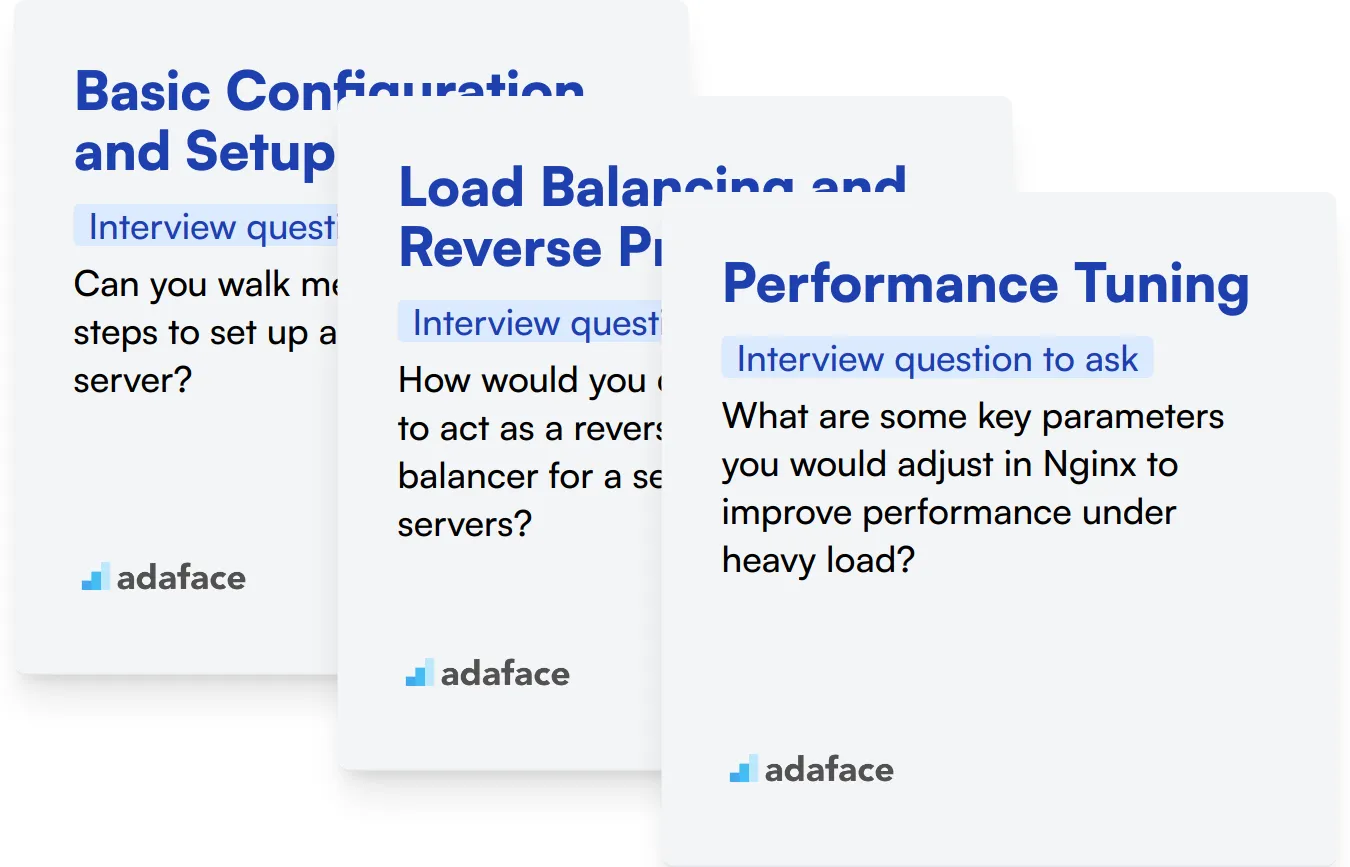
Basic Configuration and Setup
Understanding the fundamental aspects of Nginx configuration and setup is essential. This includes knowing how to install Nginx, configure it to serve static content, and set up basic security features.
To assess this skill, you can use an Nginx online test that includes multiple-choice questions (MCQs) on configuration scenarios. This will help you filter out candidates who have a strong foundational knowledge.
You can also ask targeted interview questions to gauge a candidate's experience with Nginx configurations.
Can you walk me through the steps to set up a basic Nginx server?
Look for candidates who not only list the steps but also understand the reasoning behind each step. They should be able to discuss configuration files, common directives, and basic troubleshooting.
Load Balancing and Reverse Proxy
Load balancing and reverse proxy capabilities are critical for managing high traffic and ensuring uptime. Nginx excels in these areas, so candidates should have a good grasp of these concepts.
An Nginx online test with questions focused on load balancing strategies and reverse proxy configurations can help you identify candidates who are proficient in these areas.
During the interview, you might want to ask specific questions about their experience with load balancing using Nginx.
How would you configure Nginx to act as a reverse proxy and load balancer for a set of backend servers?
Candidates should be able to explain load balancing algorithms like round-robin and least connections. They should also discuss how to set up upstream servers and handle failover scenarios.
Performance Tuning
Performance tuning is crucial for optimizing Nginx to handle large volumes of traffic efficiently. This includes tweaking configurations for caching, compression, and connection handling.
Asking targeted questions about performance tuning can help you understand a candidate’s depth of knowledge.
What are some key parameters you would adjust in Nginx to improve performance under heavy load?
Look for candidates who mention various tuning parameters like worker_processes, worker_connections, and keepalive_timeout. They should also know about enabling Gzip compression and setting up caching strategies.
Maximizing the Impact of Nginx Interview Questions
Before putting your new knowledge to use, here are some tips to make the most of your Nginx interview process. These suggestions will help you efficiently evaluate candidates and make informed hiring decisions.
1. Incorporate Skills Tests in Your Screening Process
Using skills tests before interviews can significantly streamline your hiring process. These assessments help you identify top candidates early, saving time and resources.
For Nginx roles, consider using a Nginx online test to evaluate technical proficiency. You might also want to include tests for related skills like DevOps or Docker, depending on the specific job requirements.
Implement these tests after initial resume screening but before interviews. This approach ensures that you only invest time interviewing candidates who have demonstrated the necessary technical skills.
2. Curate a Balanced Set of Interview Questions
With limited interview time, it's crucial to select a mix of questions that cover various aspects of Nginx expertise. Aim for a balance between technical knowledge, practical experience, and problem-solving skills.
Consider including questions related to web servers, load balancing, and server configuration. You might also want to add some Linux interview questions to assess their overall system administration skills.
3. Master the Art of Follow-Up Questions
Asking follow-up questions is key to understanding a candidate's true depth of knowledge. It helps you distinguish between memorized answers and genuine understanding.
For example, if you ask about Nginx's reverse proxy feature, a follow-up could be, "Can you describe a situation where you implemented this in a production environment?" This probes their practical experience and problem-solving abilities.
Use Nginx interview questions and skills tests to hire talented administrators
If you are looking to hire someone with Nginx skills, you need to ensure they have those skills accurately. The best way to do this is to use skill tests like the Nginx online test from Adaface.
Once you use this test, you can shortlist the best applicants and call them for interviews. To get started, you can sign up here or explore our online assessment platform.
Nginx Online Test
Download Nginx interview questions template in multiple formats
Nginx Interview Questions FAQs
Ask a mix of technical, performance-related, and situational questions to assess candidates' knowledge and problem-solving skills.
The number depends on the interview duration, but aim for 10-15 questions to cover various aspects of Nginx administration.
Yes, consider including hands-on tasks to evaluate candidates' practical skills in Nginx configuration and troubleshooting.
Ask questions about caching, load balancing, and optimization techniques to gauge their experience with Nginx performance tuning.

40 min skill tests.
No trick questions.
Accurate shortlisting.
We make it easy for you to find the best candidates in your pipeline with a 40 min skills test.
Try for freeRelated posts
Free resources




